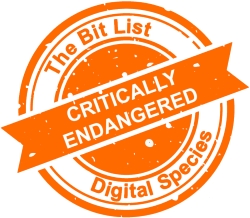Unpublished Research Data from Government Researchers
|
|
 |
|
|
Data sets and research outputs produced in the course of government research but never shared or made available outside of the initial research. In particular, the risk classification applies to research data under government embargo, restrictions due to sensitivities, classification issues, and/or materials suppressed for ideological reasons. |
||
|
Digital Species: Research Outputs |
Trend in 2023:
|
Consensus Decision |
|
Added to List: 2019 |
Trend in 2024:
|
Previously: Critically Endangered |
|
Imminence of Action Action is recommended within twelve months; detailed assessment is a priority. |
Significance of Loss The loss of tools, data or services within this group would impact on many people and sectors. |
Effort to Preserve | Inevitability Loss seems likely: by the time tools or techniques have been developed the material will likely have been lost. |
|
Examples Data sets or research outputs produced for agencies that have closed or have had funding withdrawn from research initiatives; research data from government agencies no longer active. |
||
|
‘Practically Extinct’ in the Presence of Aggravating Conditions Lack of access to archival services; sudden or unanticipated closure; loss of implicit knowledge from destabilized or demoralized staff; encryption; uncertainty over IPR or the presence of orphaned works. |
||
|
‘Endangered’ in the Presence of Good Practice Archival responsibility well developed; documentation; published through research channels. |
||
|
2023 Review This entry was added in 2019 under ‘Unpublished Research Data from US Government Researchers’. It has significant overlaps with other entries in the research outputs group but was set as a standalone entry to draw attention to two realities: 1. Research outputs are not simply a matter for academic institutions, and that government is, in fact, a major producer of research data; and 2. Political instability and threats to the continuity of government services are a significant preservation risk. The 2019 Jury noted that while it specifically related to the US government context, it did not mean that other jurisdictions are immune from political instability, and commented that politically inconvenient research outputs face particular and immediate threats of which the digital preservation community should be cognizant. No 2020 trend towards increased or decreased risk was identified. The 2021 Jury agreed with concerns raised by the 2019 assessment but recommended the broader applicability should be more explicit. The entry title and description were changed to broaden and include governments across national and international contexts. The 2021 Jury added that with the changes, the risk profile will range and depend on the political system, the political change and the measures in place to save and reuse data from disbanded research projects; in other words, there may be instances where the unpublished research data in one country may fall under the Vulnerable classification. The 2022 Taskforce agreed with this 2021 assessment with no change to trend. The 2023 Council agreed with the Critically Endangered classification with risks on the same basis as before (‘No change’ to trend) and recommended inviting additional review from an expert in this area for the next review. A further recommendation was made to consider whether it should be an individual entry or instead be incorporated as an example under the ‘Unpublished Research Data’ entry. |
||
|
2024 Interim Review These risks remain on the same basis as before, with no significant trend towards even greater or reduced risk (‘No change’ to trend). |
||
|
Additional Comments The US made the news as part of the last government, but this is probably an issue in other countries as well and is, therefore, a category that could be made more generic. One question to ask is whether the research data is considered of long-term value or considered ephemeral? |
||





































































































































